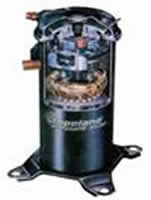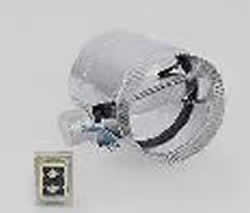<< < 1 2 3 4 5 6 7 8 9 10 11 12 13 14 15 16 17 18 19 > >>
Comparing the Human Body to an HVAC System
Just as a heart attack is the result of another problem in the body's circulatory system, rarely is the heart attack due to the heart itself. Replacing the heart is not the solution. The new heart will fail also if the cause of the heart failure isn't corrected.
The same is true for an HVAC system. If doctors determine that a new heart transplant is necessary because of the damage sustained due to extraneous reasons, they will look for a heart that is the same size for the person as well as other matching characteristics. A heart that is too large or too small will not work as well as a heart that is the proper size for the particular body.
The circulation system of each person has so much capacity and the heart should match that circulatory system to be a good replacement. Keeping this in mind, the same is exactly true for an HVAC system. The circulatory system of an HVAC system is the duct system. Too big or too small and you are going to have problems. Not finding the cause of the heart or compressor failure and most likely the new system will fail in short time also. Remember the compressor is the heart of any heat pump or air conditioning system.
 There are many similar analogies to the heart and circulation system of the body as there is to an HVAC system. They both need to breathe clean filtered air. Our noses and lungs serve as purifiers to a certain extent. Too much dirt for the nose and lungs and the body can't operate at peak capacity.
There are many similar analogies to the heart and circulation system of the body as there is to an HVAC system. They both need to breathe clean filtered air. Our noses and lungs serve as purifiers to a certain extent. Too much dirt for the nose and lungs and the body can't operate at peak capacity.
The same is true for an HVAC system. Too much dirt and the filter becomes clogged as the system capacity decreases substantially.


Is Your House Just Too Cold??
As with the Human Body the problem can be in the duct system or the circulatory system.
The circulatory system of the body is very similar to that of an HVAC system. Restrictions in the circulatory systems of both will result in too much pressure and will cause premature failure of the hearts of both machines. Notice the circulatory system of the human body in blue. This is the return circulatory system. Notice it is larger than the red supply. The same is true for HVAC.
The return system should be larger. Anything that blocks flow of the circulatory system will result in the body not working up to full power and capacity. The same is true of an HVAC system. Replacing a heart with a much larger heart will result in high blood pressure and premature failure.
Replacing a heart with too small of a heart will also result in premature heart failure. Arteries that are restricted result in high blood pressure. A duct system that is too small or restricted results in high static pressure and poor air flow.



If a body needs a larger heart the existing circulatory system would need to have changes to increase the circulatory system to match the heart. But we don't put larger hearts in our bodies than the circulatory system can handle. For each size body there is one size heart.
For each size house there is one size HVAC system. What determines the size HVAC system is the physical characteristics of the house. One size heart doesn't fit all and one size HVAC system doesn't fit all people. Consider your house as your body in this comparison. In doing so remember the heart is the compressor of the HVAC system. The HVAC system and the heart are also similar in that they both consume the most amount of energy. For a healthy body there needs to be the right sized heart and the right size circulatory system with no restrictions for the body. Any deficiencies will result in premature failure of the heart. The heart rarely fails due to deficiencies in the heart. The heart fails due to restrictions and other problems external tot he heart. The same is true of the compressor.
Over 90% of heart failures are a result of problems external to the heart such as restricted arteries. The same is true for an HVAC system. Over 95% of compressor failures are due to problems external to the compressor. Heart attacks or heart failures are a symptom of a problem, not the problem itself. Compressor failures are a result of a problem and not usually the problem itself. Simply replacing a heart without looking for the cause of the heart failure will result in the new heart failing prematurely also. Replacing the compressor of the HVAC system will result in premature failure of the new compressor as well if the cause of the problem is not found.
The worst condition for a heart is to have it go up to full beating capacity and then slow down many times per day.
 Good exercise results in the heart maintaining a high heart rate for an extended period of time rather than short bursts. short bursts of high heart beats many times per day will result in high heart failure. Heart rates that remain high for too much time during the course of a day will also result in premature heart failure. Oversizing the HVAC compressor will result in those short cycles of operation many times per day. Undersizing will result in too much operation of the compressor and result in premature failure. The right size system will result in the maximum life span of the compressor.
Good exercise results in the heart maintaining a high heart rate for an extended period of time rather than short bursts. short bursts of high heart beats many times per day will result in high heart failure. Heart rates that remain high for too much time during the course of a day will also result in premature heart failure. Oversizing the HVAC compressor will result in those short cycles of operation many times per day. Undersizing will result in too much operation of the compressor and result in premature failure. The right size system will result in the maximum life span of the compressor.
 So let's list possible causes of compressor heart attacks:
So let's list possible causes of compressor heart attacks:
Duct system too small
Oversized or Undersized HVAC system
Cheap Inefficient Dirty Filters, coils, etc. Never use a filter that is washable, the standard 1" throw away filters sold at building centers, aluminum mesh filters or any filter you can easily see through. The best filters are the 3M pleated filters installed at the return air diffusers.
 Never ever install these: These are motorized dampers that can be installed in the duct system. They block the air flow and will destroy the air circulation of the HVAC system. Honeywell makes a zone damper that bypasses the air back to the system and as a result the air flow is not affected. The best recommendation is to try to avoid the use of these motorized dampers completely. They generally have a short life span and have been the cause of many premature equipment failures. Further the control systems associated with them are can be found obsolescent by the manufacturer in a very short time frame and to upgrade can be fairly expensive.
Never ever install these: These are motorized dampers that can be installed in the duct system. They block the air flow and will destroy the air circulation of the HVAC system. Honeywell makes a zone damper that bypasses the air back to the system and as a result the air flow is not affected. The best recommendation is to try to avoid the use of these motorized dampers completely. They generally have a short life span and have been the cause of many premature equipment failures. Further the control systems associated with them are can be found obsolescent by the manufacturer in a very short time frame and to upgrade can be fairly expensive.


Here's a scary statistic. Over 50% of compressors returned under warranty are found not to be defective at all. Thank goodness these techs aren't doctors!


















